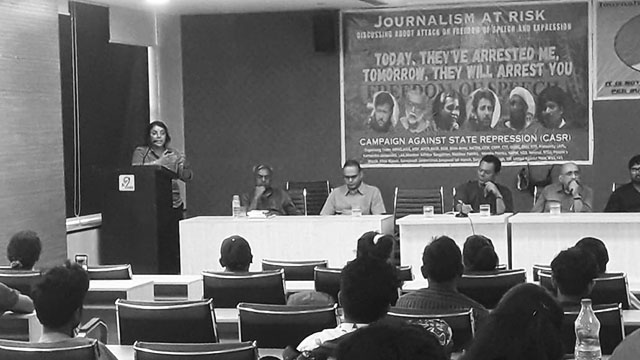On May 15th 2023, Campaign Against State Repression (CASR) held an event named “Journalism at Risk: Discussion About Attack on Freedom of Speech and Expression” at HKS Surjeet Bhavan, New Delhi. The invited speakers broadly discussed the ongoing attacks by the Indian state against journalists and independent media.
Moderator N Sachin opened the discussion by paying homage to deceased journalist Shashikant Warishe who was murdered recently for reporting against a refinery project in Ratnagiri. Sachin highlighted how journalism being at risk is a bigger symptom of society itself being at risk. He raised concerns regarding the disappearance of a form of media that reports on people’s issues.
Mandeep Punia was the first speaker, who spoke about the apathy and partisan nature of media and the various forms of media, be it what is dubbed the “Godi media” (lapdog media) or the liberal sections of the media, both raise issues which are subservient to a corporate-state nexus. He mentioned how this was visible when the liberal media houses of Delhi spoke nothing about what is happening in Punjab. He elaborated on how the third form of media, which presents an alternative. Punia called for the need for people’s journalists to also be activists in their approach to their journalism.
Bhasha Singh spoke next, highlighting how the Hindutva fascist nature of the state subtly hides the corporate loot of resources and the role of capital. She spoke of how the dominant “Godi media” has crafted narratives that centre around Hindu-Muslim conflicts and ignores the plight of the workers, peasants and the ongoing rampant corporate loot. Singh highlighted how the conflict in Manipur was similarly crafted to serve the Hindutva project. She sought hope in the growing faith of people in people’s journalists and urged these journalists to link their facts together to uncover the larger issues at hand.
Prashant Tandon spoke of the need to differentiate between what he calls “corporate democracy” and “cosmetic democracy”, especially in India where Article 19 of the constitution has so-called reasonable restrictions existing in jurisprudence along with laws like Unlawful Activities (Prevention) Act (UAPA), which actively make way for legal curtailment of journalists. He suggested that India must establish an umbrella law specifically to protect press freedom. He suggested that the US and the European Union, which may not be perfect states, offer good points of reference for such a law.
Udey Che spoke next, pointing out the issues people’s journalists on social media face regarding revenue. Since social media has no stable source of income beyond advertisements, big corporations like Facebook and YouTube get to regulate what type of media earns money. Other options are advertisements for local big businesses which are wholly owned by feudal forces like landlords who are aligned with parties like the Bharatiya Janata Party (BJP) and the Congress party. He highlighted how there is not much difference between the rule of the BJP and the Congress party in terms of press freedom, giving the example of Congress-ruled Chattisgarh where hundreds of journalists face charges. He demanded that if people’s media has to survive, it must be backed by people and these forms of media must establish bases in each city.
Paranjoy Guha Thakurta elaborated on the nature of social media as a weapon of big corporates like Meta and Alphabet behind Facebook and Google which have captured narratives in society. He urged the youth to reduce the entrapments of social media and engage in a critical fight against the new state of emergency in India which has become all-pervasive.
Sandeep Rauzi brought the discussion to the general and rapid fall of India in press freedom indices under the current regime. He elaborated that press freedom is merely subjected to the general curtailment of democratic rights all over India. He discussed how journalist Rupesh Kumar Singh was incarcerated after having a vast body of work dedicated to working-class issues. He questioned why the demand by alternative media is reduced to a call of defeating the BJP but this takes away the introspection of Congress rule which does nothing to curtail capitalism’s role in the Indian society. He urged people’s media as well as workers’ organisations to set up labour beats to directly report the issues of the working class, which are lost in most media discourse. He also urged all such journalists to come together and collectively combat the state repression.
Finally, Anil Chamadia spoke about how people’s journalists stand alone in their journey. He elaborated on how in the present, the legitimacy of a journalist is attached to how big their media house is, which is ironically owned by big corporations. He explained how these forms of media houses create journalistic pieces which are essentially packages meant for mass consumption, which actively hide the issues of Dalits, tribals, etc. He argued that this packaged media is not countered by supposed alternative media, like The Wire or Newsclick, which only react to issues. Instead, he argued that a real alternative must be creative, not reactive, in nature which inspires discourse among the masses on pertinent issues of the masses. He concluded with the argument that if India aspires to establish real democracy, it must come up with an alternate model to the current state of affairs.
Unsigned articles of People's Review are fruit of the collective wisdom of their writers and the editors; these articles provide ultimate insight into politics, economy, society and world affairs. The editorial freedom enjoyed by the unsigned articles are unmatchable. For any assistance, send an email to write2us@peoplesreview.in

